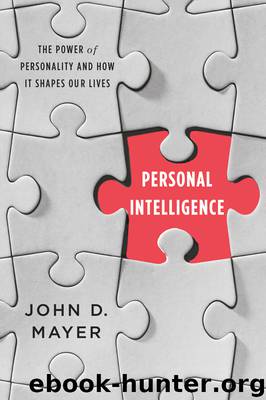Personal Intelligence by John D. Mayer

Author:John D. Mayer
Language: eng
Format: epub
Publisher: Farrar, Straus and Giroux
7
PERSONAL INTELLIGENCE IN ADULTHOOD
I once asked participants in a study which of several “big questions” about personality they found most interesting. “Who am I?” came in second highest—and it’s no wonder that questions of our identity are so intriguing: if we truly knew who we were and what our purpose was, it would make our decisions much easier because we’d know which choices fit us best. And these questions have been of interest throughout history, including to teachers of the ancient world. Around 250 BCE, for example, Kohelet (Ecclesiastes), of the Hebrew Bible, asked himself what was the best way to live. Kohelet had devoted himself by turns to scholarship, to pleasure-seeking, to acquiring property, and to religion, all with the hope of deciding “what was best for the children of men to do under the heavens for the few days of their life.” Today, just as then, questions like these simply fascinate us.
The first-place winner in my study of interesting big questions related to personality was “What is my future?” This was a good question to be intrigued by, according to the psychologists Philip Zimbardo and John Boyd, who believe that people who wonder about their futures exhibit an especially healthy form of curiosity. Zimbardo and Boyd have studied the degree to which people focus on their past, present, or future—what they refer to as an individual’s time perspective. People who live in the present, as opposed to wondering about their future, may enjoy the spontaneity and freedom that such in-the-moment styles allow, and many do quite well living that way, but those who are most present-oriented also have a greater likelihood than others of engaging in risky behaviors such as abusing drugs. By comparison, those of us who focus more on what lies ahead often shape our lives in ways that make good sense for our future.
Planning ahead wouldn’t be so interesting, I think, except that many of us really identify with our future selves. By “identify,” I mean that we care for the individual we will become, and lay the groundwork to make that later version of us as comfortable and successful as possible. People with higher personal intelligence may construct more vivid, elaborated future selves than others, and better take on the stewardship of their present lives, so as to guide themselves toward their goals.
Hal Ersner-Hershfield and his colleagues at Stanford University developed a simple method to record our sense of connection to the later versions of who we are. Participants were shown a continuum of seven pairs of circles. Each pair included one circle labeled “current self” and the other, “future self.” On this seven-point scale, the first pair of current- and future-self circles didn’t overlap at all, indicating that a person saw little relationship between who she was at present and the person she might become. Each pair overlapped a bit more until the final, seventh pair of selves, which decisively overlapped. Participants selected an alternative along the continuum to indicate how connected they were to their later selves.
Download
This site does not store any files on its server. We only index and link to content provided by other sites. Please contact the content providers to delete copyright contents if any and email us, we'll remove relevant links or contents immediately.
Rewire Your Anxious Brain by Catherine M. Pittman(17634)
Talking to Strangers by Malcolm Gladwell(11977)
The Art of Thinking Clearly by Rolf Dobelli(8920)
Mindhunter: Inside the FBI's Elite Serial Crime Unit by John E. Douglas & Mark Olshaker(7890)
Becoming Supernatural by Dr. Joe Dispenza(7155)
Change Your Questions, Change Your Life by Marilee Adams(6699)
The Road Less Traveled by M. Scott Peck(6683)
Nudge - Improving Decisions about Health, Wealth, and Happiness by Thaler Sunstein(6681)
The Lost Art of Listening by Michael P. Nichols(6526)
Enlightenment Now: The Case for Reason, Science, Humanism, and Progress by Steven Pinker(6445)
Win Bigly by Scott Adams(6354)
Mastermind: How to Think Like Sherlock Holmes by Maria Konnikova(6292)
The Way of Zen by Alan W. Watts(5841)
Daring Greatly by Brene Brown(5691)
Big Magic: Creative Living Beyond Fear by Elizabeth Gilbert(4777)
Grit by Angela Duckworth(4772)
Men In Love by Nancy Friday(4379)
Flow by Mihaly Csikszentmihalyi(4092)
The Four Tendencies by Gretchen Rubin(4056)
